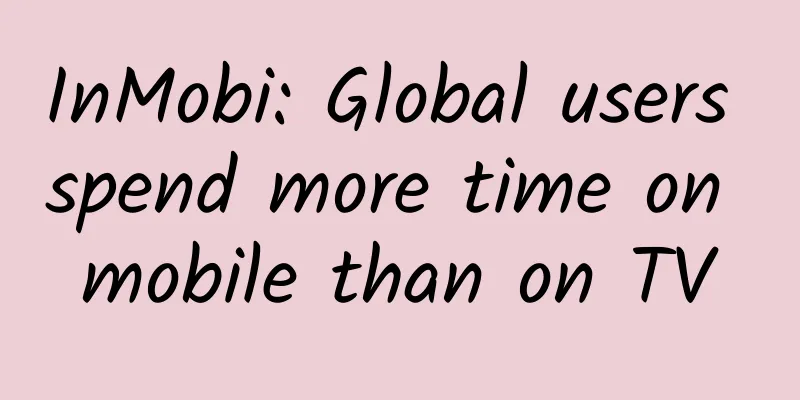InMobi: Global users spend more time on mobile than on TV

|
InMobi, the world's largest independent mobile advertising network, today released a study of mobile media consumption in 18 countries and 20,000 respondents, called "Wave 1." The survey report, completed in the fourth quarter of 2011, does not break down data by region or country. Therefore, the research results should be regarded as the global average level, which is relatively insignificant for reference, but it also shows that users are increasingly using mobile devices. InMobi's research report shows that consumers now spend more time on mobile devices than on TV:
Again, these numbers are global averages. Therefore, the numbers may vary from region to region. In fact, the research numbers from Flurry Analytics and other agencies in the US market contradict the above results. In the US, TV still accounts for nearly twice as much media time as mobile. In addition, data from Flurry (and other third-party data) show that users spend more time on mobile apps than on PCs. This data in the US market again contradicts InMobi's findings. What is clear is that users are spending more and more time on mobile devices and the mobile Internet. Therefore, InMobi's findings are correct at the international or regional level. InMobi also says that 66% of mobile users feel just as comfortable with ads on mobile as they do on TV or the internet. This may be true in many cases, but recent YouGov research in the UK and US found the opposite. Consumers are much less tolerant of ads on mobile phones than on other media: The report on attitudes towards digital advertising warns that consumers are least open to ads on mobile phones compared to other devices such as PCs, laptops and tablets. Compared to other electronic devices, the majority of consumers in the UK (64%) and the US (67%) find it unacceptable to receive unwanted ads on their mobile phones or smartphones. The report further warns that the current presentation of mobile ads is also incorrect. Among mobile internet users, less than 11% of UK users and less than 15% of US users have only clicked on a mobile banner ad once, and only one in 100 UK users and one in 50 US users click on mobile banner ads frequently. The majority of mobile internet users in the UK and the US (79% in the UK and 72% in the US) find banner ads on their phones annoying… Compiled by: William |
<<: Please check! Huaxi doctors' tips for high-quality sleep
>>: How do machines read your resume? – Infographic
Recommend
Occult blood in urine during late pregnancy means that the baby is about to be born
Women will only think about preparing for pregnan...
Can I eat bamboo fungus during menstruation?
Bamboo fungus is an edible fungus that we eat mor...
How to treat moderate vaginitis and cervical erosion?
In our lives, whether it is vaginitis or cervical...
Can I eat oranges during my period?
Actually, during the Chinese New Year, our family...
Can I still get pregnant after menopause?
Menopause is difficult for women to accept becaus...
Advantages of fallopian tube unblocking surgery
Many women have difficulty getting pregnant or ev...
Which month is it easier to get pregnant and give birth to a daughter?
There are still some widely circulated folk sayin...
What is the normal age for menopause?
Generally, menopause occurs around the age of 49....
Will ovulation occur if the yang becomes weak without strong yang?
In order to give the future baby a healthier body...
Female lower body anatomy
Most men do not understand the structure of the f...
What to do if your period is delayed in summer
Delayed menstruation has a great impact on women&...
Facebook: The most important transformation in 15 years, F8 conference opens a new chapter in building a private social network
Private space is as important as public space As i...
Why do I have stomach pain a few days before my period?
Every female friend has menstruation until she is...
Will breastfeeding make adults thinner?
Although breastfeeding greatly increases a woman&...
What to eat after beating a child
In many areas, abortion is referred to as "b...









